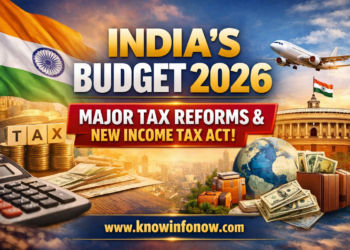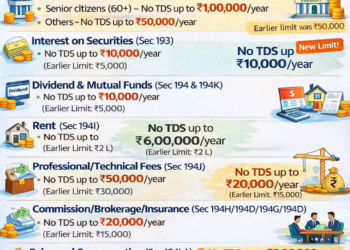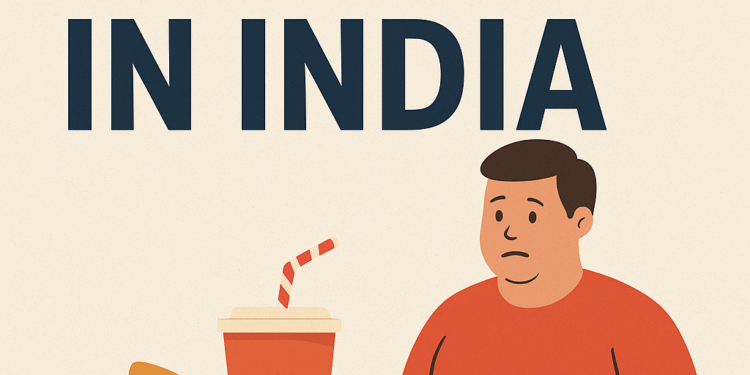Obesity has emerged as one of the most pressing public health concerns of our time. While once seen primarily as a Western lifestyle issue, it is now a fast-growing crisis in India. According to the World Health Organization (WHO), more than 2.5 billion adults globally were overweight in 2022, and of these, nearly 890 million were obese. What’s even more concerning is the dramatic increase in obesity among children and adolescents, including in India.
India, with its rapidly urbanizing population, changing diets, and growing dependence on fast food, is seeing obesity rates surge across all age groups. Unfortunately, the government’s inactive role in enforcing regulations has allowed the problem to grow unchecked.
The Junk Food and Sugary Drink Explosion
Fast Food Culture: Burgers, Pizzas, and Beyond
Over the last decade, international fast-food chains have made their presence felt in every Indian city, town, and even smaller districts. Burgers, pizzas, fries, fried chicken, and instant noodles have become staples in urban diets. These foods are inexpensive, convenient, and aggressively marketed—especially to young people. But they are also calorie-dense, nutrient-poor, and loaded with saturated fats, sodium, and refined carbs, all of which directly contribute to weight gain, hypertension, and diabetes.
Sugary Aerated Drinks: Pepsi, Cola, and More
Equally alarming is the rising consumption of aerated soft drinks like Pepsi, Coca-Cola, and similar carbonated beverages. A single 500ml bottle often contains more sugar than the entire daily recommended intake. Despite this, these beverages are positioned as “cool” lifestyle drinks in advertisements. They are sold everywhere—from high-end malls to roadside shops—and even marketed directly to children through sports endorsements and flashy packaging. These drinks do not just add empty calories; they also increase the risk of type-2 diabetes, fatty liver disease, and childhood obesity.
The Role of Marketing and Convenience
Aggressive marketing campaigns, heavy discounts on delivery apps, and combo meal promotions have normalized excessive consumption. For many working professionals and students, ordering a burger with fries and a cola has replaced home-cooked meals, leading to an alarming nutrition gap in Indian diets.
Obesity Recognized as a Disease: The Medical Breakthrough
In recent years, the global medical community has started to treat obesity not merely as a lifestyle issue but as a chronic disease. Pharmaceutical companies such as Eli Lilly are at the forefront of this change. Lilly has publicly emphasized that “obesity is a disease” and introduced innovative drug therapies that help regulate appetite and improve weight management outcomes.
This recognition is crucial for two reasons:
- It reduces the stigma attached to obesity, encouraging patients to seek medical help.
- It provides modern treatment options for people who cannot achieve results through diet and exercise alone.
These developments also open up the conversation around making such treatments more accessible in India, where obesity is often ignored until it results in life-threatening complications.
India’s Weak Policy Response
Despite the growing crisis, India’s government has been slow and passive in addressing the obesity epidemic. While countries like Mexico, the UK, and Chile have introduced sugar taxes, front-of-pack nutrition labeling, and strict junk food advertising bans, India lags far behind.
- No Sugar Tax Enforcement: There is no meaningful tax policy to discourage consumption of sugary drinks.
- School Environments: Junk food and sodas continue to be sold in school canteens.
- Weak Labeling Standards: Packaged foods rarely carry clear health warnings or calorie alerts.
- Inactive Monitoring: Health authorities do not run sustained awareness campaigns against junk food consumption.
This lack of proactive regulation allows fast-food corporations and beverage companies to market unhealthy products without accountability, especially to children and young adults.
The Way Forward for India
To reverse the obesity trend, India needs a comprehensive and multi-pronged approach:
- Policy Reforms: Introduce and strictly enforce a sugar tax on aerated drinks like Pepsi and Cola. Regulate junk food advertising, especially those targeting children.
- Public Awareness: Launch nationwide campaigns educating people on the dangers of excessive junk food and sugary beverages.
- Medical Access: Make modern obesity treatments, including those introduced by Eli Lilly, available through public health systems at affordable costs.
- Healthy Lifestyle Promotion: Encourage schools and workplaces to provide healthy meal options and promote physical activity.
- Revival of Indian Diets: Highlight the benefits of traditional Indian diets rich in millets, vegetables, lentils, and fresh fruits as sustainable alternatives to fast food.
Conclusion
Obesity is more than a cosmetic concern—it is a chronic disease with serious health risks such as diabetes, heart disease, and cancer. The unchecked rise of junk foods like burgers, pizzas, fried snacks, and sugary aerated drinks like Pepsi and Cola is driving India toward a public health disaster.
While the WHO highlights the scale of the crisis and companies like Eli Lilly develop modern treatments, India cannot afford to sit back with an inactive policy stance. Urgent government action, stronger regulations, and public health awareness are needed to prevent obesity from becoming the next big epidemic in the country.



















